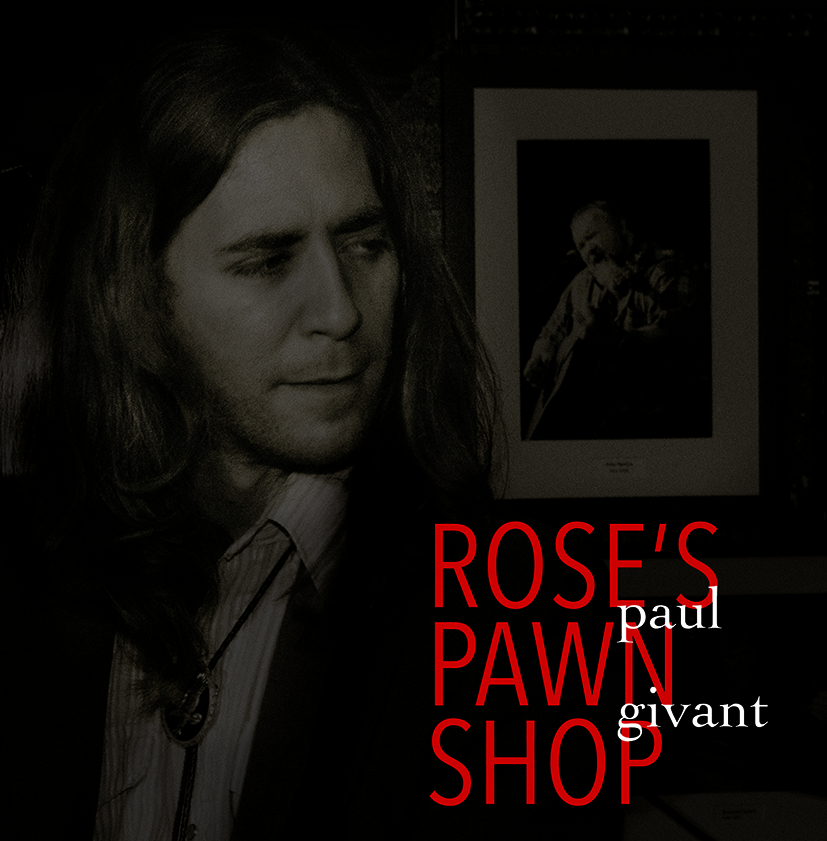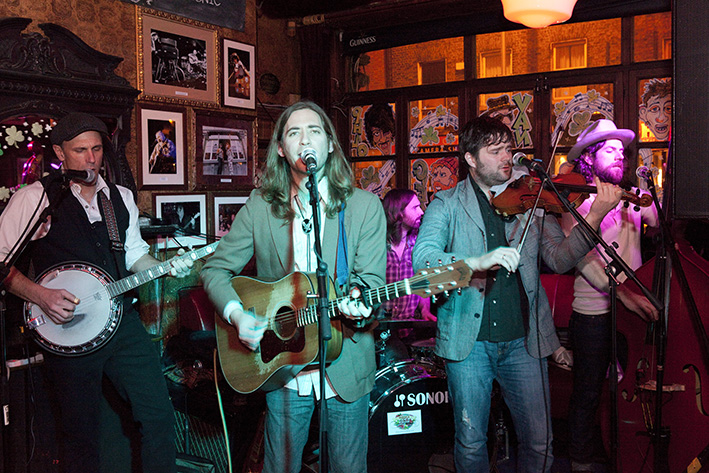
Based in Los Angeles, Rose's Pawn Shop is a five-piece band who play roots rock incorporating elements of both acoustic string band and bluegrass music with an upright bass and fiddle which can shift those elements around. Guitarist John Kraus moves from Gretsch lead guitar to banjo with ease, his skill on the former helping his playing on the latter. The band is led by singer/songwriter Paul Givant who has listened to a lot of music but found a special affinity with bluegrass and American folk music.
The band’s name came about after Givant's former partner, following their split-up, took the band's instruments and sold them to a local pawn shop. After a period of live performances they went into the studio to record their debut album The Arsonist which was followed in 2010 with Dancing on The Gallows, produced by Ethan Allen. Only Givant and Kraus survived from the first album so the current line up now also includes Tim Weed on fiddle and mandolin, Stephen Andrews on bass and Christian Hogan on drums, all of whom also add vocals to the sound.
Prior to this extensive UK/Irish tour, the band finished off their third album. On this tour they played many venues that had free entry. This was the case on their Dublin date as they playied in the relatively cramped quarters of the front bar in Whelans. The two-part set showed the band's skills and strong songs. The mix of guitar and banjo as lead instrument colour the tone of the song while the bass and drums are in tune with both textures. The fiddle touches on traditional as well as Celtic and gypsy jazz tones that give the songs depth. Paul Givant is a strong singer who was fighting a sore throat but still managed to sing out and the band gave vocal support with John Kraus singing lead on the traditional tune Sam Hall with its "God damn your eyes" refrain. While they held the attention of some casual barflies and the few who had come along especially to see them, the band will be better served next time by playing the upstairs venue.
Right before we left for this tour we hit the studio for the last month and a half and we finished what will be our third record and it's being mixed by the producer right now. We couldn't get it out in time for this tour. So we decided to tour on Dancing on The Gallows which hadn't been available over here before. It will be new to most people over here.
This is your first European tour?
Yes, this is our first time to come over. So we're finishing up the first week of the first tour over here. It's been great. We've been playing places big and small including Edinburgh and Bristol and some small places like one in Shropshire. We sold out three shows and all the others have been well attended. Not big rooms but to have over 100 people come to a show when we've never been here before is great. I hope that we can get back on a regular basis. We were told that Dublin's a little hard if you've never been before so that's why were playing here (in the front bar) to get a foot in the door the first time out. So hopefully we can build on that.
What direction will the new album take compared to the previous two?
There's many of the elements of the last record in the new album but it is a bit of a departure. It was produced by a gentleman by the name of Ted Hutt. He's worked with bands like Old Crow Medicine Show, Gaslight Anthem and the Dropkick Murphys. He was one of the founding members of Flogging Molly. He was great to work with the songs. Dancing On The Gallows pulls from a lot of styles, which is what we do; we have rock and country and bluegrass and Celtic, all of which are a part of Rose's Pawn Shop, but I think this record is going to be a little more narrow in focus. Its going to be more our own sound, a more unique signature than what we have previously put out. I mean I love our first records but I think they're more derivative sometimes than this new record will be.
How much are you directly influenced by the Californian country-roots rock tradition?
Growing up I listened to so many different types of music and in this day and age it's hard not to be exposed to a lot of different things. When I was very young I listened to the Red Hot Chili Peppers and Fishbone and bands like that. As time went on in my late teens and early twenties I got more into folk and American roots music like Woody Guthrie and Bill Monroe. As a band we come from different backgrounds and from different places but we all meet in Los Angeles. That's where I grew up myself. California is a real melting pot with so many different musical styles and cultures; a lot of fusing different styles together which is what we tend to do.
On the more contemporary side?
I remember listening to Gillian Welch, The Revelator album, and something about that record really struck me. I loved the way the songs sounded really old (but) are all current at the same time. They had a timeless quality and her writing was really straddling that line. She was writing songs that could have been written 100 hers ago. But they also seemed very relevant to people's lives. That record made me want to try and write songs like that, so that record was a huge influence on me. I mean we're not trying to sound like that album but rather more current but still with sounds that are sonically old.
Is the writing generally a solo concept or more of a group effort?
The general process is that I will write these song on my own, then I'll bring them to the guys and they'll help me flesh them out. They like to say that I start the song and then they'll fix it (laughs). I want to say finish it, they want to say fix it. This recent record has been a bit more collaborative. I started the songs but we had more time to work together from that starting point. Some of the songs we started at moment one together.
A lot of the album is acoustic based but there is still that rock element; a lot of banjo and fiddle with acoustic guitar and stand-up bass. Then we have the drums and electric guitar thrown in here and there. It's still very much acoustic based. We hope to have the album out later this year. It's being mixed right now. A lot depends on whether it goes out on a label or we do it ourselves.
Would a label be something that would be your first choice?
We have never released through a label yet. We've always done things independently. That has its benefits, but a label can help a lot in other ways. It tends to lend some level of credibility to what you're doing. They have the money to do more extensive marketing. We're open to working with a label if it's the right fit.
We have a manager who will be shopping the album around. There are some pretty good connections between our producer and manager and some labels that seem initially interested. We had just recorded the record and had one day off before we got on a plane to come over here. We haven't even heard it. So I don't know what it sounds like (laughs). I heard some playback in the studio but barely anything. Ted, our producer, is a really smart guy so I'm excited to her the final mix.
Do you tour a lot in the current climate?
We have kind of turned ourselves into a touring band so we tend to play mostly outside of LA. We tour at least 100 days a year and probably then play LA two or three times a year. Some bands play there every week but that is not us. We've been lucky over the last couple of years to get more and more festival opportunities, some of the Americana roots festivals. We've got some great ones coming up including playing with the Del McCoury Band. One is called Old Settlers Music Festival which is held just outside Austin, Texas. We have also done some dates supporting bands like Reckless Kelly and Railroad Earth and we recently went out with Bighead Todd and The Monsters. We’re getting more of those opportunities now.
There are a lot of festivals that do a pretty good job of mixing the new acts with the more traditional ones. We've played them with people like Sam Bush and Old Crow Medicine Show. We kinda straddle the line with some of the more underground bands too. Bands like Hillgrass Bluebilly are good friend of ours. There's something honest about putting down the electric guitar and picking up a banjo. There's a band from LA, Old Man Markley, who are from that background, they have that punk/bluegrass thing going on. Compare this to most of what is getting country radio airplay now, which is either pop or mainstream 80s rock. On the other hand, while Americana is a broad thing there are many traditionalists who get real uptight if you move away from what they think bluegrass should be.

